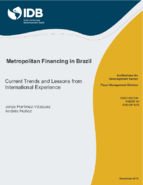Metropolitan Financing in Brazil: Current Trends and Lessons from the International Experience
Date
Dec 2018
This paper argues that the need for metropolitan-wide government is higher the larger the unrealized benefits from economies of scale and externalities. It contends that there is no trade-off between the advantages of small fragmented local governments versus those of large, consolidated government units. The latter are superior for public services that exhibit large economies of scale and yield considerable externalities, while smaller types of government can be optimal for the delivery of most other public goods. From this perspective, the most desirable model of metropolitan governance is a two-tier system embedding those two types of governments, preferably both elected and accountable. Large economic and fiscal disparities within metropolitan areas inhibit cooperation. An important step is to free metropolitan authorities of redistribution concerns and for this purpose rely instead on a nationwide equalization grant system. In addition, in light of the best international practice we offer ideas that would help enhance the effectiveness of metropolitan finance in Brazil, including rethinking expenditure and revenue assignments for the metro-wide areas, introducing federal and state fiscal transfers that accrue directly to metropolitan funds, and allowing broader access to prudential borrowing.




